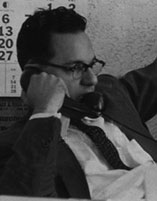New work celebrates life of Ark. civil rights pioneer
Trish Hollenbeck
FAYETTEVILLE, Ark. — Wiley Austin Branton could have had an easy life. He could have stayed in his hometown of Pine Bluff and worked in his family’s taxi business. His family was well-to-do financially and respected in the community.
Instead, Branton was a pioneer with other African Americans who wanted to attend the University of Arkansas School of Law in Fayetteville. In 1953, he became the third black person to graduate from the law school.
He devoted the rest of his life to fighting for civil rights, not just for black people, but for everyone.
Branton served as the chief counsel for the black plaintiffs in the 1957 Little Rock desegregation case. He was one of the lawyers, along with Thurgood Marshall, who kept the Little Rock Board of Education in court and fought in the legal arena to continue desegregation efforts.
“Little Rock was really just the beginning for him,” said Judith Kilpatrick, a UA School of Law professor who has written a book about Branton, titled “There When We Needed Him.”
The book tells Branton’s story, which includes much more than the role he played in the Little Rock crisis.
He worked to register black voters and championed civil rights on the national level, and it wasn’t always an easy road, Kilpatrick said.
“There was a lot of danger over the years,” she said. “He did what was right.”
He was head of the Atlanta-based Voter Education Project from 1962 to 1965, when 600,000 black voters were registered.
He worked for President Lyndon Johnson, who named him executive secretary of the Council on Equal Opportunity, and he served as special assistant to attorneys general Nicholas Katzenbach and Ramsey Clark, a period in which he helped implement the 1964 Civil Rights Act and the 1965 Voting Rights Act.
Branton provided leadership to the United Planning Organization, the Alliance for Labor Action and the National Association for the Advancement of Colored People.
He was dean of Howard University School of Law in 1978, serving until 1983.
In his work, he not only cared for the rights of blacks but also worked for poor whites, Hispanics and other minorities, Kilpatrick said, and he was a strong advocate for education and government-supported job training.
“He was definitely not a radical,” Kilpatrick said. “He believed in the rule of law. He believed in structure and rules.”
Kilpatrick, the associate dean for diversity, planning and special projects at the UA School of Law, has written several articles about Branton. The Branton biography, published by the UA Press, was the first book Kilpatrick wrote. She said she wanted it to be accessible to the public. The point of the book is how one person made such a big difference, she said.
“He did wonderful things,” she said. “He’s a role model.”
She said that Branton would still be working for civil rights if he were alive today, and that he once stated in a speech toward the end of his life that he was kind of disappointed in the progress of civil rights. He died in 1988.
(The Northwest Arkansas Times)
|
| Wiley Austin Branton became just the third black person to graduate from the University of Arkansas School of Law in Fayetteville, Ark. Upon graduating, Branton devoted his entire life to the struggle for civil rights, serving as the chief counsel for the black plaintiffs in the 1957 Little Rock desegregation case with Thurgood Marshall. A new book by UA School of Law professor Judith Kilpatrick, “There When We Needed Him,” details much of what Branton accomplished in his storied life. (Photo courtesy of amazon.com) |
|



